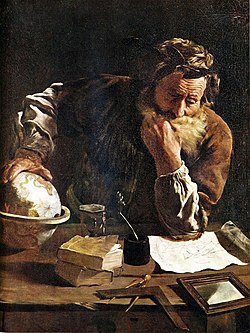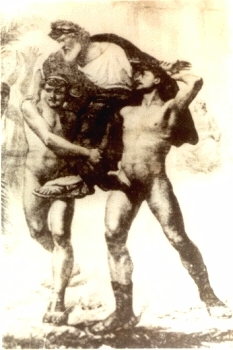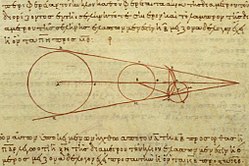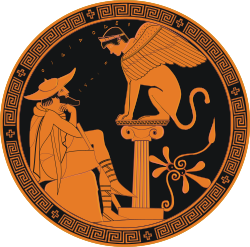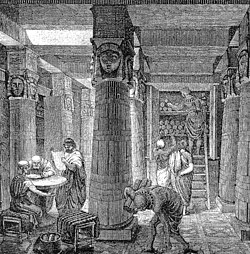Αα
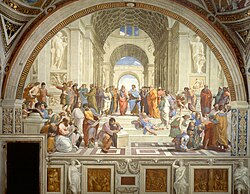
- Ἀγεωμέτρητος μηδεὶς εἰσίτω.
- Ageōmétrētos mēdeìs eisítō.
- "Let no one untrained in geometry enter."
- Motto over the entrance to Plato's Academy (quoted in Elias' commentary on Aristotle's Categories : Eliae in Porphyrii Isagogen et Aristotelis categorias commentaria, CAG XVIII.1, Berlin 1900, p. 118.13–19). [1]
- Ἀεὶ Λιβύη φέρει τι καινόν.
- Aeì Libúē phérei ti kainón.
- "Libya always bears something new", Aristotle, History of Animals .
- Compare the Latin proverb ex Africa semper aliquid novi 'from Africa always something new', based on Pliny the Elder.

"A jackdaw is always found near a jackdaw"
- Ἀεὶ κολοιὸς παρὰ κολοιῷ ἱζάνει.
- Aeì koloiòs parà koloiôi hizánei.
- "A jackdaw is always found near a jackdaw"
- Similar to English "birds of a feather flock together."

- Ἀεὶ ὁ θεὸς γεωμετρεῖ.
- Aeì ho theòs geōmetreî.
- "God always geometrizes." — Plato
- Plutarch elaborated on this phrase in his essay Πῶς Πλάτων ἔλεγε τὸν θεὸν ἀεί γεωμετρεῖν "What is Plato's meaning when he says that God always applies geometry". [2] Based on the phrase of Plato, above, a present-day mnemonic for π (pi) was derived:
- Ἀεὶ ὁ θεὸς ὁ μέγας γεωμετρεῖ τὸ σύμπαν.
- Aeì ho theòs ho mégas geōmetreî tò súmpan.
- Always the great God applies geometry to the universe.
| ἀεὶ | ὁ | θεὸς | ὁ | μέγας | γεωμετρεῖ | τὸ | σύμπαν |
|---|---|---|---|---|---|---|---|
| 3 letters | 1 letter | 4 letters | 1 letter | 5 letters | 9 letters | 2 letters | 6 letters |
- Ἀετοῦ γῆρας, κορυδοῦ νεότης.
- Aetoû gêras, korydoû neótēs.
- "An eagle's old age (is worth) a sparrow's youth."

- αἰὲν ἀριστεύειν
- aièn aristeúein
- "Ever to Excel"
- Motto of the University of St Andrews (founded 1410), the Edinburgh Academy (founded 1824), and Boston College (founded 1863). The source is the sixth book of Homer's Iliad, (Iliad 6. 208) in a speech Glaucus delivers to Diomedes:
- "Hippolocus begat me. I claim to be his son, and he sent me to Troy with strict instructions: Ever to excel, to do better than others, and to bring glory to your forebears, who indeed were very great ... This is my ancestry; this is the blood I am proud to inherit."
- Αἴκα.
- Aíka.
- "If."
- Plutarch reports that Philip II of Macedon sent word to the Spartans, saying that "if I should invade Laconia, I shall drive you out" (ἂν ἐμβάλω εἰς τὴν Λακωνικήν, ἀναστάτους ὑμᾶς ποιήσω). The Spartans laconically responded with "if." [3]
- Ἀνάγκᾳ δ’ οὐδὲ θεοὶ μάχονται.
- Anánkāi d' oudè theoì mákhontai.
- "Not even the gods fight against necessity." — Simonides, 8, 20.
- Ἀλλὰ τὶ ἦ μοι ταῦτα περὶ δρῦν ἢ περὶ πέτρην;
- Allà tì êi moi taûta perì drûn ḕ perì pétrēn?
- "But why all this about oak or stone?"
- English : Why waste time on trivial subjects, or "Why make a mountain out of a mole hill?"
- Hesiod, Theogony, 35.
- Ἀνδρῶν γὰρ ἐπιφανῶν πᾶσα γῆ τάφος.
- Andrôn gàr epiphanôn pâsa gê táphos.
- For illustrious men have the whole earth for their tomb. Pericles' Funeral Oration from Thucydides, History of the Peloponnesian War 2.43.3
- Ἀνεῤῥίφθω κύβος.
- Anerrhíphthō kúbos.
- Alea iacta est .
- Latin: "The die has been cast"; Greek: "Let the die be cast."
- Julius Caesar as reported by Plutarch, when he entered Italy with his army in 49 BC. Translated into Latin by Suetonius as alea iacta est.
- Ἄνθρωπος μέτρον.
- Ánthrōpos métron.
- "Man [is] the measure [of all things]"
- Motto of Protagoras (as quoted in Plato's Theaetetus 152a).
- ἅπαξ λεγόμενον
- hápax legómenon
- "Once said"
- A word that only occurs once.
- ἀπὸ μηχανῆς Θεός
- apò mēkhanês Theós
- Deus ex machina
- "God from the machine"
- The phrase originates from the way deity figures appeared in ancient Greek theaters, held high up by a machine, to solve a problem in the plot.

- Ἀπὸ τοῦ ἡλίου μετάστηθι.
- Apò toû hēlíou metástēthi.
- "Stand a little out of my sun."
- Legendary reply of Diogenes the Cynic when Alexander the Great asked him if he had any wish he desired to fulfil — version recounted by Plutarch [4]

- Ἄριστον μὲν ὕδωρ.
- áriston mèn húdōr.
- "Greatest however [is] water" — Pindar, Olymp. 1, 1
- Used as the inscription over the Pump Room at Bath.
- αὐτὸς ἔφα
- autòs épha
- Ipse dixit
- "He himself said it"
- Argument from authority made by the disciples of Pythagoras when appealing to the pronouncements of the master rather than to reason or evidence. The Latin translation of the phrase comes from Marcus Tullius Cicero in De Natura Deorum (On the Nature of the Gods)







